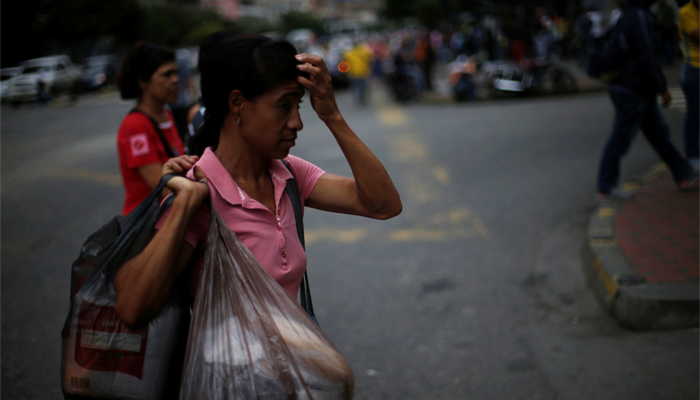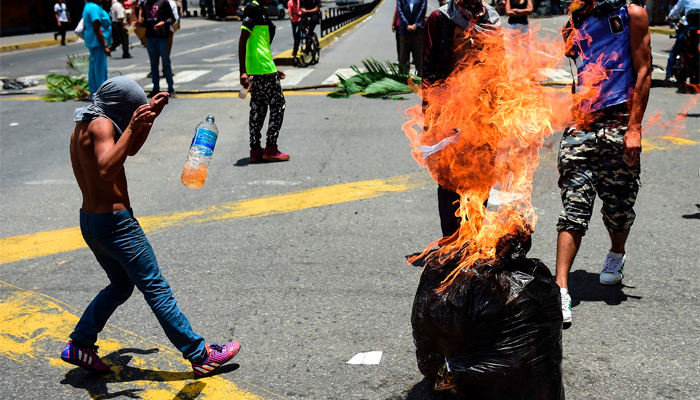Venezuela trembles under price surge amid new US sanctions
August 10, 2017

PUNTO FIJO/CARACAS: The extreme volatility of Venezuela's exchange rate has the crisis-hit country's shop owners hurriedly marking up their merchandise and consumers baulking at the higher price tags.
Just last week, the bolivar currency tanked around 70 percent on the black market, according to DolarToday – the opaque US-based web site that dictates the black market rate.
Although the currency roared back this week to around 10,387 bolivars to the US dollar, prices for often imported products have already been adjusted, heaping more hardship on Venezuelans who often earn only a handful of dollars per month.
"How is it possible that I bought rice a few days ago at 8,000 bolivars, which was already expensive, and now it's at 17,000," said Senovia Gonzalez – a 64-year-old housewife – standing in a line to buy food in the Paraguana Peninsula that juts out into the Caribbean.
The monthly minimum wage in Venezuela is 97,531 bolivares, or not even $1 per day on the parallel exchange rate, making it the lowest in Latin America despite President Nicolas Maduro's frequent increases. To that is added a 153,000-bolivar food ticket.
Maduro's unpopular socialist government has dispatched inspectors to try to contain the price hikes with fines, but that strategy has been largely ineffective in the midst of an economic crisis with three-digit inflation, recession, and food and medicine shortages.
"If we do not adjust prices, we have to close, fire employees, work for someone else, or leave the country," said Victor Moreno, a seller of home appliances at a mall in Paraguana.
The opposition-controlled parliament said on Wednesday that inflation in the first seven months of the year was 248.6 percent. The Central Bank has not published official figures for almost two years when numbers began to worsen.
Many Venezuelans are horrified at the weakening bolivar, which has lost well over 99 percent of its value in the last three years. Social media users promoted the hashtag #worktoeat this week.
'Aggressive speed'
Maduro blames an "economic war" waged by US-backed coup plotters seeking to bring him down. He has threatened to jail "speculators" who raise prices.
Critics say the decade-old currency controls alongside excessive money printing contribute to inflation and a weakening exchange rate.
However, with the government increasingly short of dollars to supply the currency control system, more imports are obtained using the black market rate.
In the first half of the year, about 25 percent of all imports were made by private companies using the black market, according to local consultancy Ecoanalitica.
That means Venezuelan prices are even more sensitive to changes on the black market.
"Prices are reacting with aggressive speed," said the head of Ecoanalitica, Asdrubal Oliveros.
"Not only shop owners, but all the economic actors in the country see that although the rate has strengthened again, it is not sustainable in the long term and in a month will weaken again," he added.
New sanctions by the US
The United States imposed new sanctions on crisis-hit Venezuela on Wednesday, targeting members of a controversial, all-powerful, loyalist assembly installed last week to bolster what Washington calls the "dictatorship" of Maduro.
The measures were aimed at six members of the so-called Constituent Assembly – among them the brother of late president Hugo Chavez – as well as a military officer in charge of security for the body, and a board member of the national electoral authority.
They added to previous US sanctions on Maduro himself – a rare step against a sitting head of state – imposed just before the assembly was elected on July 30 in a vote marred by violence, fraud allegations, and an opposition boycott.
"President Maduro swore in this illegitimate Constituent Assembly to further entrench his dictatorship, and continues to tighten his grip on the country," US Treasury Secretary Steven Mnuchin said in a statement.
"This regime's disregard for the will of the Venezuelan people is unacceptable, and the United States will stand with them in opposition to tyranny until Venezuela is restored to a peaceful and prosperous democracy."
The announcement came as the Constituent Assembly and Venezuela's supreme court took actions to limit the opposition's ability to challenge Maduro.
The assembly has established a "truth commission" which Maduro has said he wants to examine alleged crimes by opposition leaders – especially those in charge of the country's legislature, which his Socialist Party lost control of two years ago.
Sweeping powers
The assembly also fired the attorney general, Luisa Ortega, who broke ranks to become an outspoken critic of the president.
The supreme court ordered the jailing of an opposition mayor who allowed anti-government protests in his Caracas district and was mulling similar cases against others.
Ostensibly brought in to rewrite the constitution, the Constituent Assembly has sweeping powers to override all other branches of government.
It has vowed to remain in operation for up to two years – beyond the scheduled end of Maduro's term in 2019.
Those targeted in the US sanctions announced Wednesday included Adan Coromoto Chavez, the brother of the late president who was Maduro's mentor before he died of cancer in 2013.
Tania D'Amelio Cardiet – the National Electoral Council board member – was designated for defending the assembly and for suspicion of being involved in fraud in its choosing.
Bladimir Humberto Lugo Armas – the security official – "has been involved in several acts of violence against National Assembly opposition members," including against the body's leader, Julio Borges, the US statement said.
The sanctions freeze the US assets of those targeted and ban American entities from doing business with them.
Battling isolation
Major Latin American nations and Canada have also rejected the legitimacy of the Constituent Assembly and slammed Venezuela for "breaking democratic rule".
The UN rights office has also condemned "excessive force" by Venezuelan security forces against protesters who objected to the Constituent Assembly and who are angry about an economic crisis that has made food and medicine scarce amid hyperinflation and a nose-diving currency.

Since the protests turned violent four months ago, nearly 130 people have died.
Protests against Maduro have become muted in the past week, however, as the Constituent Assembly started sitting and intensified a clampdown, though the opposition has urged demonstrators to continue.
The opposition coalition on Wednesday said it would field candidates in overdue regional elections set for December 10 to pressure Maduro to make sure they are held, and with an eye to winning most of Venezuela's 23 states.
Although broadly criticised, Venezuela is not entirely isolated internationally. It can count on the support of Russia and China – which have granted tens of billions of dollars in loans to Venezuela.
On Tuesday, Caracas hosted a number of leftist allies – including Cuba, Bolivia, and Ecuador, as well small Caribbean nations to which it gives cheap oil – in a meeting to show solidarity.
Maduro told the representatives he was open to regional dialogue – as long as Venezuela was "respected".
The leader reaffirmed that the difficulties he was facing were driven by an "imperialist" United States that wanted Venezuela's oil.
"Venezuela is the big prize, the jewel of the crown – that's what they say in the corridors in Washington," he said.











